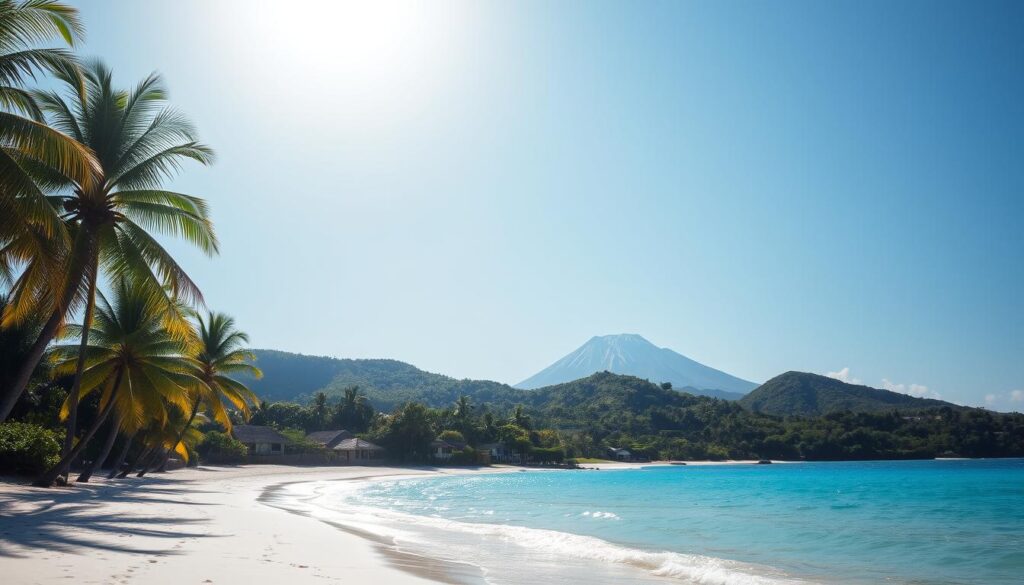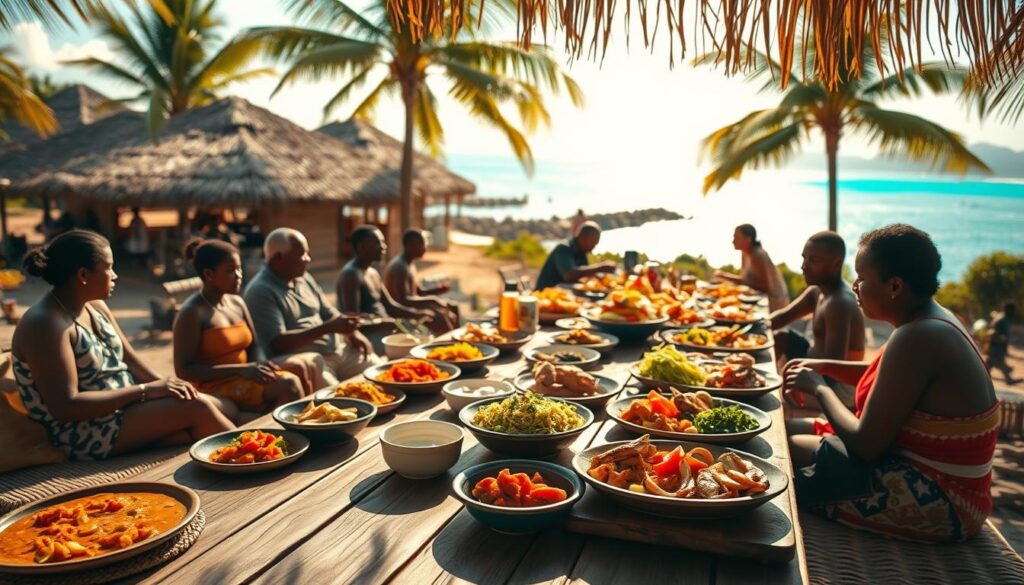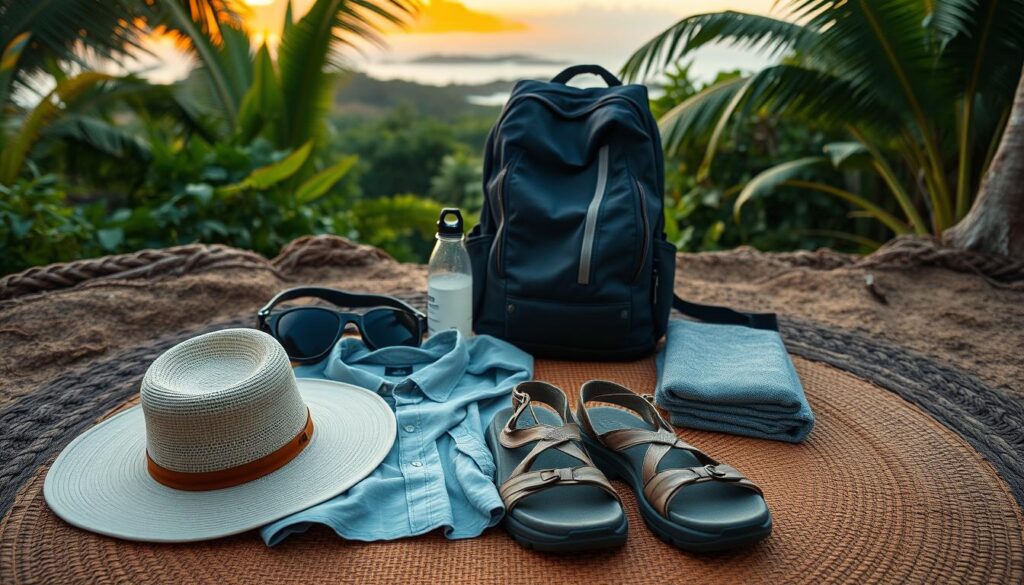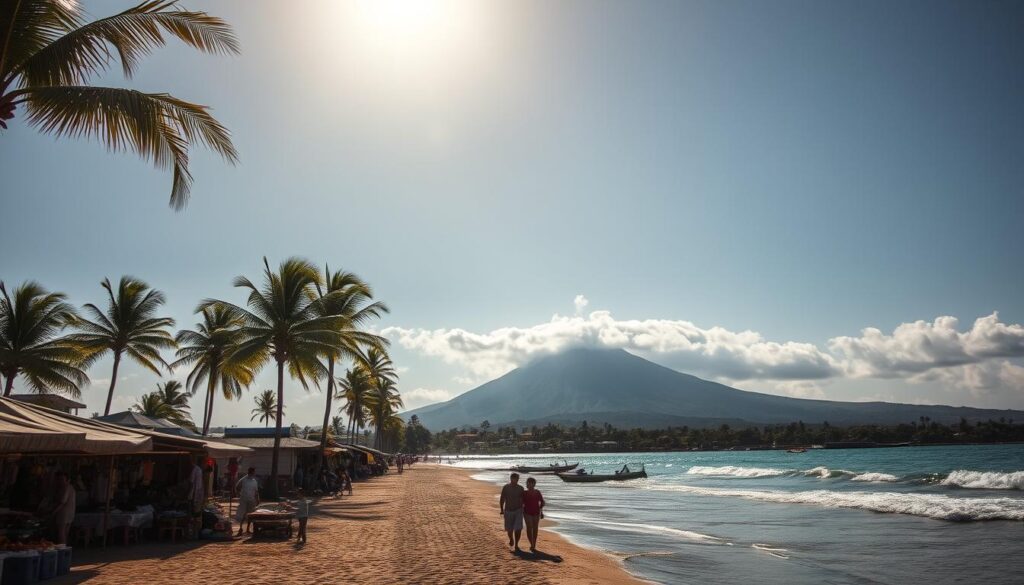Did you know 83% of travelers to the Comoros archipelago describe their experience as “life-changing” despite its rugged charm? This three-island nation offers pristine beaches and lush jungles untouched by mass tourism. Yet smart explorers know adventure thrives where preparation meets opportunity.
Government advisories from Canada and the U.S. highlight practical realities: medical facilities here resemble basic clinics rather than modern hospitals. Volcanic terrain means roads wind through dramatic landscapes – breathtaking views come with occasional infrastructure challenges. Crime rates remain low compared to global averages, but emergency response capabilities differ sharply from what you’d expect in major cities.
Local communities welcome visitors with genuine warmth, sharing fragrant ylang-ylang plantations and spice markets bursting with vanilla pods. Your journey demands awareness of active Mount Karthala’s mood swings and seasonal weather patterns. Pack your sense of wonder alongside a well-stocked first-aid kit – this destination rewards those who embrace its raw authenticity.
Key Takeaways
- Multiple governments recommend caution due to limited emergency services
- Violent crime remains rare, but petty theft precautions are wise
- Medical facilities lack advanced equipment and specialists
- Active volcanoes and tropical storms require flexible planning
- Local culture prioritizes hospitality toward respectful visitors
- Travel insurance with medical evacuation coverage is essential
Travel Logistics: How to Get to the Comoros Islands
Reaching these spice-scented shores requires strategic planning that unlocks authentic adventures. Three international gateways welcome travelers – Moroni’s Prince Said Ibrahim Airport (HAH), Anjouan’s Ouani Airport (AJN), and Mohéli Bandar Es Salam Airport (NWA). Direct flights from Paris, Nairobi, and Addis Ababa connect you to volcanic vistas rising from the Indian Ocean.
Sky Routes and Island Connections
Air travel dominates access to the archipelago, with Kenya Airways and Ethiopian Airlines offering reliable connections. Once landed, inter-island ferries and small planes let you hop between Grande Comore’s lunar landscapes and Mohéli’s marine sanctuaries. Always confirm boat schedules locally – tidal patterns dictate maritime movements.
Documentation Dance: Passports to Paradise
Your passport becomes a golden ticket when stamped with the visa d’entrée available at all entry points. Remember these crucial details:
| Requirement | Details | Tips |
|---|---|---|
| Passport Validity | 6+ months post-departure | Check expiration before booking |
| Visa Fee | €30-50 (cash only) | Carry euros in small bills |
| Proof of Exit | Return/onward ticket | Print digital confirmations |
| Overstay Penalty | €50/day + legal risk | Mark departure date boldly |
Officials prioritize smooth arrivals for prepared travelers. Keep documents organized in waterproof sleeves – tropical humidity loves to blur ink. With paperwork perfected, you’ll breeze through customs into a world where frangipani blooms outnumber traffic lights.
Understanding Comoros: What the Islands Are Known For
Imagine a place where crescent moons crown mosque minarets and volcanic peaks pierce cotton-candy clouds. This archipelago nation blends spiritual traditions with raw geological power, creating a destination that feels both ancient and alive.
Where Faith Meets Fire Mountains
The country’s Islamic roots shape daily rhythms – hear the melodic call to prayer echo through vanilla-scented villages. Over 98% of the people practice Sunni Islam, visible in colorful Friday markets where women trade spices in shiromani veils.
Mount Karthala’s steaming crater reminds visitors of the land’s fiery origins. Trek through misty cloud forests to peer into this active volcano, where eruptions last reshaped the terrain in 2007. Below its slopes, black-sand beaches meet coral reefs teeming with parrotfish.
| Natural Feature | Cultural Connection | Best Experience |
|---|---|---|
| Volcanic Lakes | Sacred swimming rituals | Dry season hikes |
| Spice Plantations | Traditional medicine practices | Harvest festivals |
| Coral Atolls | Dhow boat craftsmanship | Snorkeling tours |
December through April transforms the islands into emerald jewels. Monsoon rains feed waterfalls cascading down basalt cliffs – pack quick-dry clothing for these months. Locals celebrate the lush growth with Grand Mariage ceremonies, multi-day feasts showcasing the country’s French-Arab-African fusion.
This information reveals why the archipelago remains one of Africa’s best-kept secrets. Your journey here becomes living content for stories about resilient cultures thriving in nature’s dramatic theater.
Is Comoros Safe for Tourists? Key Safety Considerations

Navigating safety in this island nation blends cultural awareness with practical precautions. While serious incidents prove uncommon, understanding local norms transforms potential challenges into rewarding interactions.
Respecting Local Norms and Emergency Protocols
Islamic traditions shape daily life here. Public alcohol consumption remains prohibited, and same-sex relationships carry legal consequences. Always ask permission before photographing people or religious sites – government buildings and ports are strictly off-limits.
| Emergency Service | Contact Number | Response Time |
|---|---|---|
| Police | 17 | 15-30 mins (urban) |
| Medical | 18 | 30+ mins (rural) |
| Fire | 18 | Limited availability |
Smart Exploration Strategies
Crowded markets and beaches demand extra vigilance against pickpockets. Use crossbody bags and avoid flashing expensive gear. Nighttime strolls require caution – stick to well-lit areas or explore with trusted guides.
These proactive steps enhance your security:
- Carry photocopied documents in separate luggage
- Learn basic French/Arabic phrases for clearer communication
- Confirm transportation plans with local accommodations
By blending respect for traditions with thoughtful preparation, you’ll unlock the islands’ secrets while maintaining personal safety. Your adventure thrives where cultural sensitivity meets traveler savvy.
Culinary Adventures: What to Eat on the Comoros Islands

Ever tasted a coconut-infused octopus curry as the Indian Ocean breeze carries the scent of ylang-ylang? Your taste buds embark on their own expedition here, where centuries of trade routes simmer in every spice-rubbed fish stew.
Local Dishes and Street Food Highlights
Start with langouste à la vanille – succulent lobster bathed in vanilla sauce, a fusion of French technique and island-grown spices. Street vendors serve mkatra foutra, fluffy pancakes drizzled with cardamom honey, perfect for breakfast on-the-go. Don’t miss these flavor-packed staples:
- Mataba: Cassava leaves pounded with coconut milk
- Pilao: Fragrant rice cooked with cloves and saffron
- Bouillon de poisson: Spicy fish soup with lime zest
Dining Tips and Cultural Etiquette
Follow the golden rule: “Boil it, cook it, peel it, or leave it” to avoid stomach troubles. During Ramadan, respect local customs by eating discreetly – many restaurants remain open but draw curtains. Always use your right hand when sharing communal plates, and compliment chefs with “Shihiri!” (Delicious!) to connect with people.
Markets burst with jackfruit and lychees – wash produce with bottled water before indulging. For sunset dinners, beachside “warung” huts offer grilled seafood on banana leaves. Time your meals early; most eateries close by 9 PM as families gather for evening prayers.
Packing Essentials for Your Comoros Journey

What transforms a suitcase from baggage to adventure armor in these spice-scented islands? Strategic packing becomes your secret weapon for navigating volcanic trails and vibrant markets with equal confidence.
Weather-Ready Wardrobe and Activity Gear
Lightweight fabrics rule here. Choose breathable linen shirts and loose cotton pants that shield skin from equatorial sun while respecting local clothing customs. Pack convertible pieces – a sarong doubles as beach cover-up or mosque-appropriate attire.
January through May demands cyclone precautions. Waterproof dry bags protect electronics during sudden downpours. Include quick-dry towels and sturdy sandals for waterfall hikes – trails turn slippery when monsoon rains arrive.
| Category | Essential Items | Pro Tip |
|---|---|---|
| Electronics | Solar charger, headlamp | Power banks survive outages |
| Hydration | Filter bottle, electrolyte tabs | Avoid plastic waste |
| Footwear | Water shoes, hiking sandals | Reef-safe sunscreen |
Your activities dictate specialty gear. Snorkelers need rash guards; trekkers require broken-in boots. Leave space for market finds – handwoven baskets make perfect souvenirs. Remember: layered clothing adapts to changing microclimates across the islands’ diverse terrain.
Pack smart, and you’ll dance through rain showers and spice markets with everything needed for spontaneous discoveries. The islands reward those who prepare thoroughly but travel lightly.
Exploring Local Attractions and Things to Do
Dramatic landscapes meet living history across these volcanic islands, where every trail tells a story. From cloud-wrapped peaks to coral-fringed shores, your days here pulse with discovery – if you know where to look.
Volcanic Treks and Ocean Adventures
Mount Karthala’s smoldering crater offers more than Instagram-worthy views. Guided hikes reveal steaming fumaroles and rare bird species, but require checking eruption alerts with the Institut de Recherche et Développement. Coastal areas dazzle with empty beaches, though riptides demand caution. Follow local advice on swimming zones – turquoise waters hide powerful currents.
| Activity | Location | Safety Tip |
|---|---|---|
| Volcano hiking | Grande Comore | Hire certified guides |
| Snorkeling | Mohéli Marine Park | Check tide charts |
| Beach exploration | Chomoni Beach | Avoid solo swimming |
| Spice farm tours | Anjouan Highlands | Wear closed-toe shoes |
Time Capsules of Island Heritage
Friday markets in Mitsamiouli burst with hand-carved dhow models and clove-scented air. The 15th-century Old Friday Mosque in Iconi stands as a testament to Swahili-Arab architecture – its coral stone walls whisper tales of sultans past. Respect photography restrictions near sacred sites.
Villages like Itsandra reveal daily rhythms unchanged for generations. Watch fishermen mend nets using techniques passed down through centuries, then join a “Twarab” music circle as dusk paints the sky. These cultural encounters thrive when approached with curiosity and patience.
Exciting Nearby Attractions and Excursions
Charting a course through turquoise waters reveals hidden treasures where volcanic peaks meet coral kingdoms. The archipelago’s three jewels – Grande Comore, Anjouan, and Mohéli – each offer distinct adventures waiting beyond the horizon.
Navigating Island Connections Safely
Ferry travel between islands lets you chase sunrise views over the Mozambique Channel. Prioritize vessels displaying these safety markers:
| Safety Feature | What to Check | Red Flags |
|---|---|---|
| Life jackets | Visible storage racks | Moldy or torn equipment |
| Capacity limits | Posted passenger count | Standing-room-only crowds |
| Maintenance | Engine noise consistency | Oil slicks around hull |
Reputable operators like Mohéli Adventures provide bilingual safety briefings. Morning crossings often mean calmer seas – perfect for spotting dolphins racing alongside the bow.
Beach Paradises Worth the Journey
Grande Comore’s Chindini Coast rewards travelers with black sand beaches framed by coconut palms. For ultimate seclusion:
- Anjouan’s Moya Beach – accessible only by local fishing boat
- Mohéli’s Itsamia – turtle nesting grounds under starry skies
“The real magic happens when you respect both the ocean’s power and local wisdom,” advises marine guide Fatima Mohamed. Time your return trips before dusk when winds pick up, ensuring smooth sailing back to port.
Smart adventurers balance wanderlust with caution – verifying vessel conditions through hotel concierges reduces risk while preserving authentic experiences. Your island-hopping journey becomes safer when partnering with crews who value passenger safety as much as breathtaking destinations.
Travel Tips & Safety Guide: From Health to Transportation
Your journey through volcanic trails and spice markets demands smart preparation as much as adventurous spirit. Balancing health safeguards with transport wisdom lets you focus on discovering hidden waterfalls and vibrant coral reefs.
Health Armor for Island Exploration
Vaccinations form your first line of defense. The CDC recommends:
| Vaccine | Protection | Timing |
|---|---|---|
| Yellow Fever | Required if arriving from risk countries | 10 days pre-travel |
| Hepatitis A&B | Food/waterborne illnesses | 2+ doses |
| Malaria | Prophylaxis essential | Start 1 week before |
Local clinics often lack advanced equipment – pack a travel medical kit with wound closure strips and rehydration salts. “Insurance with air evacuation coverage isn’t optional here,” warns Dr. Amina Said, tropical medicine specialist.
Navigating Roads and Waters
Potholed roads wind through lush landscapes, where sudden downpours create mudslides. Opt for morning travel when visibility peaks. Follow these transport strategies:
- Hire drivers familiar with mountain routes
- Verify ferry life jackets before boarding
- Carry emergency satellite communicators
Night travel increases risk – most roads lack lighting. For inter-island hops, choose vessels displaying current safety certifications. Your vigilance ensures every journey becomes part of the adventure, not a setback.
Budgeting and Practical Information for Travelers
Mastering the art of cash navigation unlocks authentic experiences in this archipelago nation. Your financial strategy becomes the compass guiding you through markets bursting with vanilla pods and beachside fish grills sizzling over coconut husks.
Daily Costs and Financial Safeguards
| Expense | Average Cost | Smart Strategy |
|---|---|---|
| Street Meal | 500 KMF ($1.10) | Carry small bills for vendors |
| Guesthouse | 15,000 KMF/night | Book direct for best rates |
| Island Ferry | 8,000 KMF | Verify departure times locally |
Currency Wisdom for Smooth Exploration
The Comorian franc rules transactions – make sure to exchange euros upon arrival at Moroni’s airport. Banking services remain limited, so stockpile cash like precious spices. High-end lodges might accept cards, but always carry backup funds.
Insurance proves vital beyond medical coverage – make sure your policy protects against ferry cancellations or volcano-related delays. Local guides help navigate currency exchanges in smaller villages where crisp euro notes command better rates.
With 90% of transactions cash-based, services like SIM cards or park fees demand physical currency. Tuck emergency funds in separate pouches – this financial prep helps you focus on waterfall discoveries rather than payment panics.
FAQ
What are the visa requirements for visiting the islands?
Travelers need a valid passport with at least six months’ validity and a visa, which can be obtained on arrival or through embassies. Fees vary by nationality—check the Comoros Ministry of Foreign Affairs website for updates.
Are there health precautions I should take before arrival?
Vaccinations for hepatitis A, typhoid, and yellow fever are recommended. Carry antimalarial medication and insect repellent—local clinics may have limited supplies. Travel insurance covering medical evacuation is strongly advised.
How safe is public transportation for tourists?
Shared taxis and ferries are common but often overcrowded. Opt for private transfers for long distances, and avoid night travel on rural roads. Always confirm ferry schedules in advance due to weather-related delays.
What cultural customs should I be aware of?
Dress modestly, especially near religious sites. Public displays of affection are frowned upon, and alcohol consumption is restricted outside licensed venues. Respect local traditions by asking permission before photographing people.
Which areas should solo travelers avoid after dark?
Stick to well-lit areas in Moroni and Mutsamudu. Avoid carrying large amounts of cash or valuables in markets. Register with your embassy upon arrival for emergency alerts.
What’s the best way to manage currency exchange?
Euros and USD are widely accepted, but Comorian francs are essential for small purchases. ATMs are scarce outside major towns—bring enough cash and use banks for secure exchanges.
Can I explore the islands independently?
Yes! Hire local guides for hiking Mount Karthala or snorkeling Mohéli’s marine parks. Download offline maps, as cellular coverage is unreliable in remote regions.
What unique dishes should I try during my stay?
Don’t miss langouste à la vanille (vanilla lobster) and mataba (cassava leaf stew). Street food like mkatra foutra (coconut bread) offers affordable, authentic flavors—ensure vendors use clean water.
- Madeira Travel Guide 2026: Top Things to Do, Best Itineraries & Insider Tips
- Tinajani Canyon Peru: Ultimate Travel Guide to the Valley of Stone Giants, Elevation, Trails & FAQs
- Isla Suasi: The Complete Guide to Peru’s Private Lake Titicaca Island
- Ikara-Flinders Ranges — Complete Travel Guide for 2026
- Phillip Island, Victoria: Ultimate Travel Guide (Wildlife, Best Time to Visit & Insider Tips)


hello!,I like your writing very much! share we communicate more about your article on AOL? I need a specialist on this area to solve my problem. Maybe that's you! Looking forward to see you.
Thank you for your feedback and appreciation.
You may contact us at info@xploreheaven.com via email and shall discuss further.
This actually answered my downside, thanks!
Aw, this was ann exceptionally nice post. Finding the time and actual effor to create a very good article… but what
can I say… I procrastinate a lot and don't seem to get anything done.
This is a topic close to my heart cheers, where are your contact details though?
info@xploreheaven.com
It's truly a nice and helpful piece of info. I am satisfied that you simply shared this useful info with us. Please keep us informed like this. Thank you for sharing.
It¦s actually a nice and helpful piece of information. I am glad that you just shared this useful info with us. Please stay us up to date like this. Thanks for sharing.
This is really fascinating, You're an excessively skilled blogger. I've joined your feed and look ahead to looking for more of your great post. Also, I have shared your website in my social networks!
I dugg some of you post as I cerebrated they were very useful very useful
Really enjoyed this post, how can I make is so that I receive an email whenever you publish a fresh article?
It's a pity you don't have a donate button! I'd definitely donate to this fantastic blog! I suppose for now i'll settle for book-marking and adding your RSS feed to my Google account. I look forward to fresh updates and will talk about this website with my Facebook group. Talk soon!
certainly like your website however you need to test the spelling on several of your posts. A number of them are rife with spelling issues and I find it very troublesome to inform the reality however I?¦ll surely come back again.